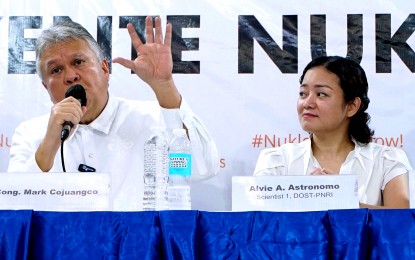
NUCLEAR POWER. Rep. Mark Cojuangco and Department of Science and Technology - Philippine Nuclear Research Institute scientist Alvie Astronomo speak at the Pandesal Forum in Quezon City on Friday (Nov. 24, 2023). Cojuangco, who chairs the House of Representatives Special Committee on Nuclear Energy, underscored the need to expedite the use of a nuclear power facility in the Philippines. (PNA photo by Ben Briones)
MANILA – The Philippine government was urged on Friday to set a clear direction in its nuclear energy policy and expedite plans to switch on the country’s first nuclear power plant in the near term.
At the Pandesal Forum in Quezon City, nuclear energy advocate Alpas Pilipinas lead convenor Gayle Certeza said many businesses, especially in the manufacturing sector, could no longer bear the high cost of electricity in the country without alternative sources of power, such as nuclear, which is a reliable and clean source of energy.
“Our businesses are very much affected. Many of our investors may pull out from the Philippines because of the high cost of electricity here. So, when Bangladesh operates its nuclear power plants, many of our factories may go to them because of cheaper power cost,” Certeza said in Filipino.
Chairperson of House of Representatives Special Committee on Nuclear Energy, Rep. Mark Cojuangco, said Bangladesh would start operating its 1,200-megawatt (MW) nuclear power plant before the year ends or by the first quarter of next year and another facility with almost the same capacity.
“In a span of two years, Bangladesh will have nuclear power plants four times the capacity of the Bataan Nuclear Power Plant (BNPP),” he said.
Cojuangco said the country could switch on its first nuclear power plant within the Marcos administration by rehabilitating the BNPP.
He said if the government immediately decides to reactivate the mothballed nuclear power facility in Central Luzon, the rehabilitation could take about four years, which could be switched on before the end of President Ferdinand R. Marcos Jr.’s term.
He added that building a new conventional power plant could take seven years to be completed.
Cojuangco underscored the need to expedite the commencement of the operation of a nuclear power facility at the soonest possible time as the economy incurs losses for every year that the country does not have a nuclear power plant.
"What did we lose by not having a nuclear power? Is it possible – if we have cheaper cost of electricity and we have nuclear power supply – that our GDP (gross domestic product) increased by 1 percent for each year for the last 37 years? Then, our economy should be 37 percent bigger today. How much trillion of pesos, million of jobs did we lose?" he said.
Department of Science and Technology - Philippine Nuclear Research Institute (DOST-PNRI) scientist Alvie Astronomo, on the other hand, cited that nuclear energy’s contribution to South Korea’s economy is about 2.2 percent.
Cheaper than coal
Cojuangco explained how running a nuclear power plant becomes cheaper than coal.
He said running a 600-MW coal power plant would require importing 40 fuel assemblies equivalent to 50 ships with 50,000 tons of capacity amounting to USD600 million, which could last 18 months.
The same capacity for a nuclear power plant has a fuel assembly that can fit in a traditional jeepney, with the import bill only amounting to USD20 million that could also be used for the same period.
He said this could cut electricity costs for consumers by less than 50 percent.
Aside from reducing power costs, Cojuanco said, going nuclear would also help the country achieve its clean energy goals as nuclear power reactors do not emit carbon dioxide.
He said rolling out policies to promote nuclear energy is in line with the Chief Executive’s goal of having a reliable, cleaner, and cheaper source of electricity. (PNA)
